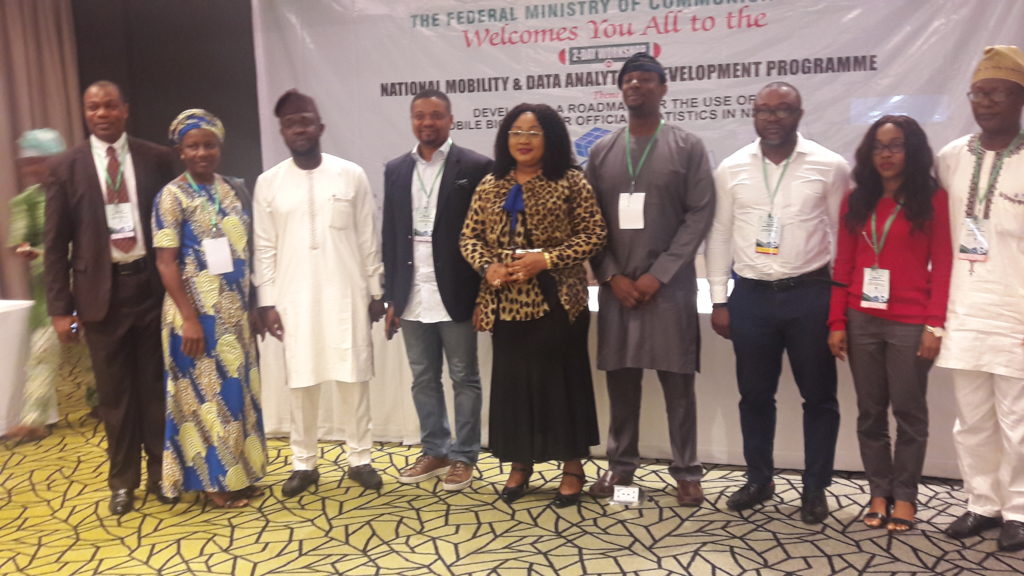- Proposes Policy On Mobile Big Data
- Asks For Agency for Mobile Big Data Management
By Aaron Ukodie
A group of experts, drawn from the public and private sector, which met for two days in Lagos, at the Radissan Blu Hotel, Ikeja, has recommended how to make Nigeria the data science capital of Africa by 2023.
The meeting was organised by the ministry of communication with representatives of several MDAs and mobile phone network operators and security officials participating.
Bernard Ewah of Keoun and Dr Patrick Oghuma of the ministry of communications facilitated and coordinated the meeting, which also had Basil Udotai, Managing Partner of Technology Advisors, Ngozi Oguejiofor, Director Telecoms and Postal Services, Lola Talabi-Oni of National Bureau of Statistics and Tope Fashedemi, Director eGovernance at the Communication Ministry leading the discussion groups.

Members of the group passionately spoke on the need for a timely implementation of their recommendation, which would soon be forwarded to the federal government through the Ministry of Communication.
It also provided for a plan to develop the commercial Infrastructure and human capital required to position Nigeria as the data science capital of Africa 2023 and identified the use to which mobile big data analytics could be put.
They said Nigeria could not afford to lag behind in the area of mobile big data analytics, as it helps to rev the economy, provide alternate source of income and acquisition of needed new skill sets and job creation.
Highlights of the recommendation include the formulation of a clear policy on Mobile Big Data, and that there should be a political will to consciously back up the Mobile Big Data policy and push for its implementation. It also includes the designation of an Agency to establish a central repository for aggregating and management of mobile data for socio-economic development of Nigeria.
The policy should review legal instruments and mandates of relevant institutions including NCA, NITDA Act, NITDA Data Protection Guidelines (now NITDA Data Protection Regulation), and International Practices.
The policy should focus on privacy of MBD and privacy of Individual Customer Information based only on statistical aggregated data and not individual-level identifiable information, and it should focus on disaster management, mobility analysis, training of AI algorithms.
The MBD policy should provide for the recognition of the Critical National Infrastructure Protection Regulation pursuant to S.2 of the Cybercrime Act.
The group said this regulation which is currently in process should be pushed to timely promulgation given its potential to guide against deliberate destruction of mobile infrastructure such as Base Stations and Cell Sites, which pose a direct challenge to MBD adoption in the country.
According to members of the group, the policy should also provide for mandatory storage and retention of mobile phone data (MPD) to be adopted as a key element of the policy as a measure to guarantee availability and protection of MNOs against civil or criminal liabilities by individuals or groups as a result of access to MPD granted to third parties, especially in relation to potential privacy violation or stigmatization through re-identification
It also recommended Trustee Ownership of MBD by MNOs, such that they would see themselves as trustees in releasing same as needed, or enabling access by researchers or development experts, for societal or public good.
And because MNOs are reluctant to share MPD for fears related to competition the group recommended that the policy provide for MNOs to submit their MPD to the dedicated MBD infrastructure; and also that no access would be granted to any MNO of other MNOs data.
There were also recommendations around privacy and the legal need to create balance between the societal value of statistical data (in aggregate) and the protection of privacy of individuals through data anonymization.
The group argues that existing legislation such as the Nigeria Communication Act, the NITDA Act, the Cybercrime Act, among others were not adequate to vitiate the call for an MBG policy and regulation.
The group also called for a centralized repository of mobile data in the country where mobile data can be aggregated, related to and managed.
It noted that the country is lacking policy direction to commercialize opportunities from mobile data and that Nigeria should benchmark other countries that have developed and deployed facilities to harness mobile data for commercial use.
The policy should also provide for capacity building and manpower development of the needed human capital to manage the data business and that human capital development should not be limited to universities alone.
According to the group implementation and operation of functional mobile big data analytics structure offers new window for job creation for Nigerians and government should therefore provide enabling environment and incentives to encourage investors to derive value from data management business.
It is the expectation that the proposed mobile data analytics will be achieved by using Keoun’s data processing technology to produce new statistical data for governments, business corporations and development agencies across multiple domains including population and migration statistics, transportation and urban redevelopment, tourism and hospitality, healthcare, public security and education.
The workshop also recommended that Nigeria should build capacity by conceiving and introducing a major Annual Mobile Big Data Conference, enter into partnership with existing Conferences and events.
Organize hackathon events to encourage Startups through software competitions focused on big Data Analysts and domesticate the United Nations portal on Big Data Analytics
The meeting identified nine areas to which mobile big data analytics can be put to use. They include food production, infrastructure development, tourism statistics, security, employment statistics, and rural, urban and international migration, among others.
The group said its recommendations are specifically focused on mobile big data (MBD) as distinct from Big Data generally.













